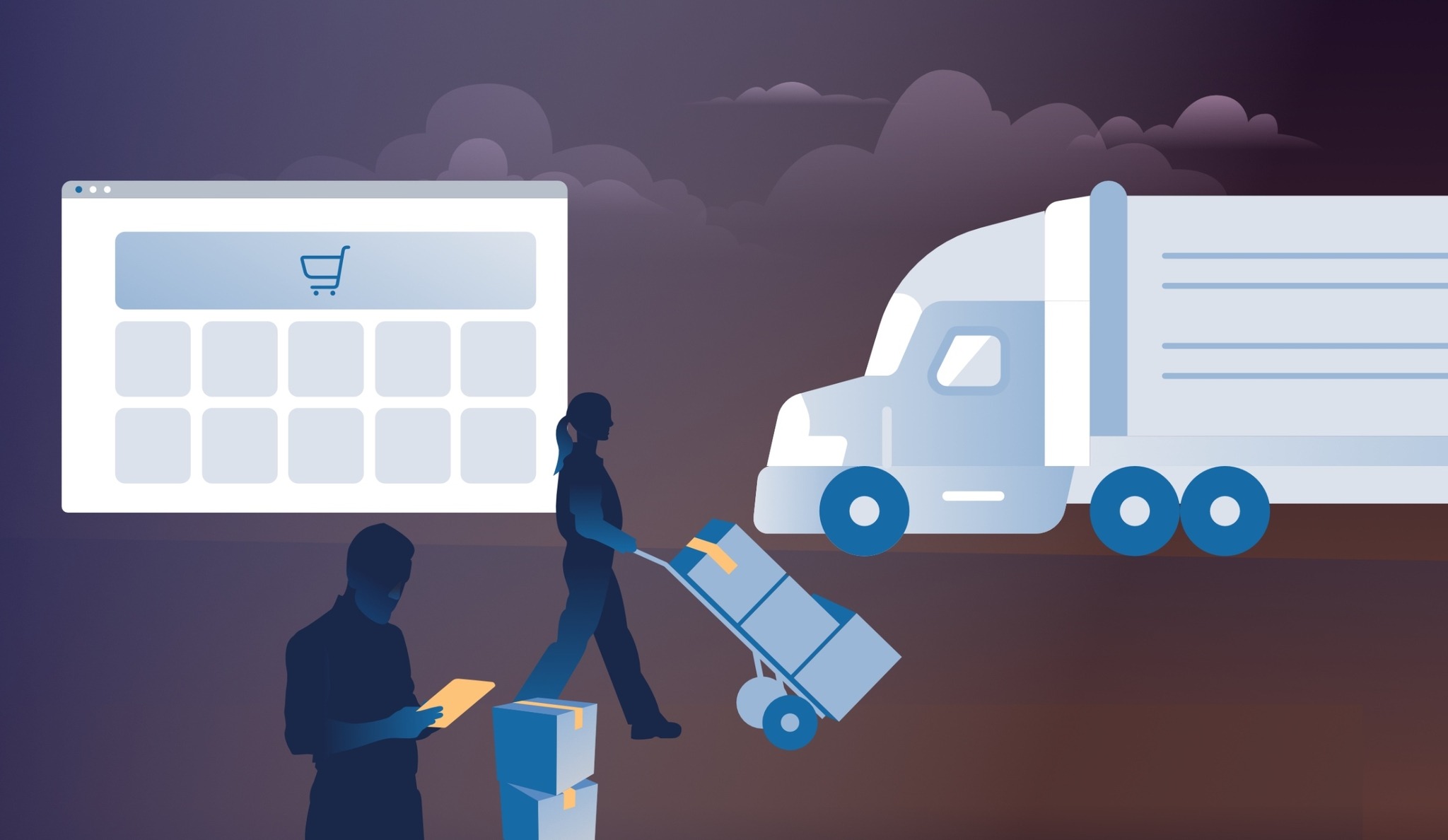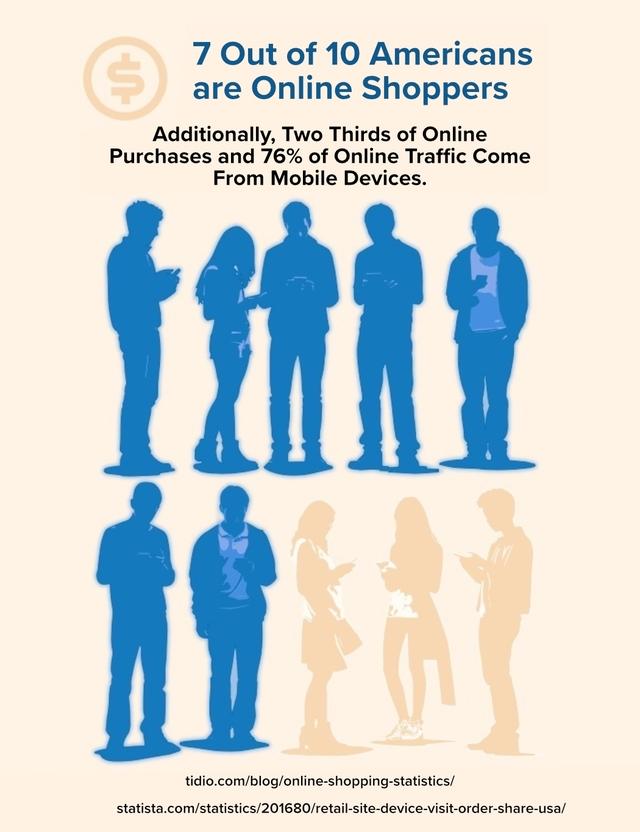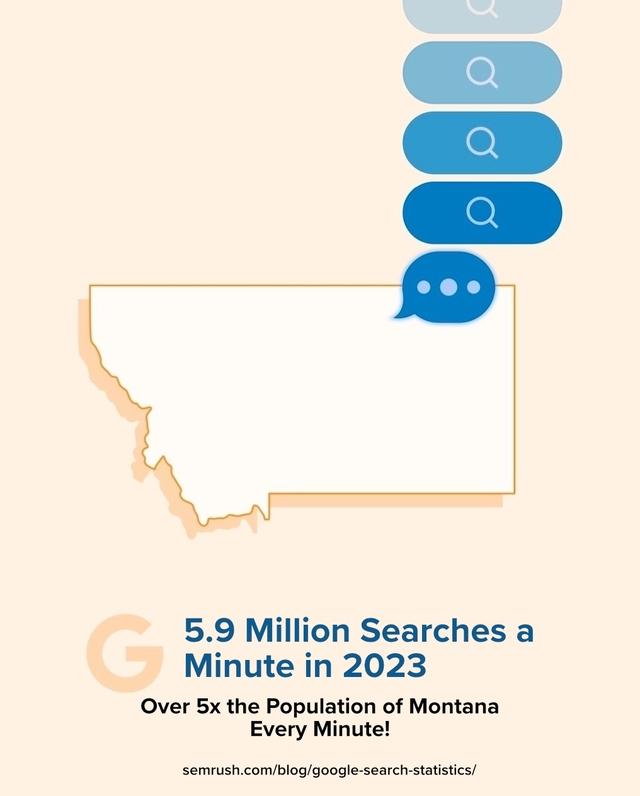
8 Essential Components of an Online Store
One thing has become clear in our time working with ecommerce businesses in Montana. Most businesses can benefit from an online store in the new digital marketplace—no matter the industry.
Our website design team has built Ecommerce websites for large Ecommerce brands like Financial Education, Inc, and smaller brands like Forking Thai Sauce and Montana Yellowstone Tours.
Our time working with businesses at every level has taught our team what actually matters in your online store.
What Are the Benefits of an Ecommerce Website?
Ecommerce is crucial for many businesses. In 2018, we wrote about the importance of an Ecommerce site. Back then, we cited an increasing demand for online options from customers—even for small businesses.
Customer demand skyrocketed again in 2020 during the Covid-19 pandemic. Demand for good online shopping sites has continued to grow into 2023.

7 in 10 Americans Are Online Shoppers
According to Tidio, around 7 in 10 Americans are online shoppers. Statista found that nearly two thirds of online purchases and 76% of online traffic in 2024 came from mobile devices.
So, what makes a good Ecommerce website? Our Ecommerce team has identified 8 key traits. Ecommerce websites should:
- Be mobile friendly
- Be easy-to-use and browse
- Include a well-thought-out payment processing system
- Be scalable
- Offer transparent, easy-to-access policies
- Work to understand how their audience wants to purchase
- Have strong branding
- Use high-quality images
A fully-featured Ecommerce website built on cutting-edge technology is a powerful tool. So, let’s look at the 9 things to consider when building an Ecommerce website.
1. Can Shoppers Use Your Online Store on Mobile?
In June of 2024, Google announced that they would no longer index the desktop version of websites, no exceptions. Because of this, any online store needs to perform well on mobile to show up in search.
Unfortunately, poorly built sites from non-technical developers and almost every template website builder do not prioritize mobile speeds or a good responsive user experience. It’s not uncommon for templated or poorly constructed Ecommerce sites to take 10+ seconds to load or to break and resize badly on mobile devices. In the least severe cases, you will lose trust with a sloppy layout. In the most severe, a customer won’t be able to check out at all.
In 2024, Tool Tester analyzed 4 billion websites and found that mobile websites took 8.6 seconds to load. This is down from Think With Google’s 2015 reported 15.3 seconds. Still, 8 seconds will fail in Google's Core Web Vitals.
In these, and many other ways, sites and site builders advertised as ‘mobile responsive’ often fall short.
The Ecommerce landscape continues moving toward a mobile future. If your web store isn’t set up to work for modern, mobile customers, you’ll just be losing money.
2. Is Your Website Easy to Navigate?
The best Ecommerce websites are easy for future customers to use—starting with your website’s layout and performance. A fast-loading website that provides a simple, logical path to your products and services is more likely to lead to sales.
WP Rocket found that 40% of customers will abandon a website that takes more than 3 seconds to load. Additionally, the more pages your website has, the more likely customers will be able to find what they need.
Smart Insights also provides a helpful breakdown of Google’s ideal UX guidelines. Their advice tells us several things.
- Treat your homepage like a shop window. Elevate more popular products and try to answer your audience’s core needs right away.
- List your core services or product categories first in your main navigation to avoid confusing shoppers.
- Offer site search or product page filters to help shoppers find what they need.
A great example of an optimized home page and filters is Miller’s Jewelry. Their:
- Home page is gorgeous and speaks directly to their core audience
- Their primary product categories are easy to find in the main navigation
- Their search is powerful and their product page filters are highly visual, unique, and easy to use
So, a good Ecommerce website is two things. Fast enough to get customers onto the website and helpful enough to keep them there.
3. Is Your Payment Processing Efficient?
Payment processing is one of the most important aspects of your online store. Without a reliable solution, you won’t be able to sell at all.
Payment processing systems are intricate, and they have a direct effect on your bottom line.
Choosing a provider without understanding how payment processing works can put your business in a bad place. We recommend going to a local firm like REM Solutions—one of our partners in business. Local firms, like REM Solutions, understand the options Montana businesses have. They also understand the best ways to save you money in the process.
Payment processing systems are intricate, and they have a direct effect on your bottom line.
Choosing a provider without understanding how payment processing works can put your business in a bad place. We recommend going to a local firm like REM Solutions—one of our partners in business. Local firms, like REM Solutions, understand the options Montana businesses have. They also understand the best ways to save you money in the process.
4. Are Your Policies Correct and Easy to Access?
For most people, a flexible Ecommerce website means two things.

There Were More Than 5.9 Million Google Searches Every Minute in 2023
Ecommerce policies are essential to safe business operations. Depending on your business, you will likely need several of the following:
- A Terms of Service
- A Privacy Policy
- Returns and Exchanges Policy
- Shipping Policy
- A Tax Policy
At the least, every business that collects personal information needs a privacy policy. Depending on factors like your product and location, you can build out the rest.
Your policies also need to be easy to access. That often means links to the policies that appear during checkout or in the footer. Every business requires unique legal considerations best handled by a professional. We recommend asking your lawyer for help creating a set of policies that protects you and your customers.
Easy-to-access policy pages are necessary to do business online in a responsible way. This often means links to each policy in the footer and links to any relevant policies on the final payment screen.
5. Are You Tracking Customer Behavior?

In Person Browsing
One of the most important resources for any business is information. Gathering customer information is easy if you have a brick-and-mortar business. You see how customers browse, what they buy right away, and what they save up for.
Websites require special tools like Google Analytics to collect similar data. If you’re not tracking customer behavior on your website, you’re likely missing out on valuable information.
Google Analytics breaks the customer journey down into a purchase funnel, allowing you to track customer acquisition, behavior, and conversion. Customer journey information is crucial for any business and Google Analytics, or GA4 as it’s more commonly known, is relatively easy to set up. If you don’t have a GA4 account already, we recommend setting one up or hiring a marketing professional to set one up for you.
Google’s in-house guide will walk you through the process step by step. If you get lost, feel free to reach out to our marketing team for help.
6. How Well Is Your Website Branded?
How often have you visited a store because you liked their sign? Chose a book because the cover looked interesting? Good branding is powerful.
We recommend creating a brand that represents your business with bold, memorable strokes. Choose colors and a logo that accent your message. Write a mission statement or slogan that declares your mission with confidence.
We also recommend hitting the following four tangible aspects of your brand as outlined in “The impact of brand image on customer satisfaction and brand loyalty: A systematic literature review” (Pub Med Central). Those are experience, sociality, function, and appearance.
You can do this by asking the following questions:
- Do you have imagery and how-to guides that explicitly show or describe your products in use?
- How do you want your customers to feel after their purchase? Think words like ‘cool,’ ‘techy,’ or ‘safe.’
- Does your website tell customers how their life will improve after purchasing your products?
- Does your website look professional and do your icons, color schemes, and logo reinforce your brand?
Each of these aspects — color palette, logo, slogan, and tangibles — make up how a customer perceives your brand. The more trustworthy your Ecommerce website is, the more likely you are to make the sale.
Good branding brings customers back. You can read more about branding decisions in our logo design blog and in our business slogans blog.
7. Are You Using High-Quality Images?
75% of people who buy online use product photos as key factors in their buying decision. 50% of those same buyers feel that large, clear photos influence their decision more than descriptions or reviews.
High-quality images make an impression on customers and on Google. When a customer browses your site, they will try to picture the product you sell in their life. The better your image, the easier that process is, and the more likely they are to buy. Gold star if your product photos show the item being used by your ideal customer in addition to nice, close up, images of basic details.
Google’s search algorithm also loves good images. Google wants to rank websites they view as ‘useful’ to future customers. Part of being useful, at least in Google’s eyes, is providing high-quality, well-optimized content for users to consume.
In other words, ecommerce websites NEED high-quality, detailed product images to have a successful online store.
8. Are You Displaying Customer Reviews?
Businesses are 270% more likely to sell an item that has 5 or more reviews versus no reviews, according to the Spiegel Research Center.
In other words, accessible reviews equal more trust and more sales. If your website doesn’t support reviews, we encourage commerce businesses to make every effort to drive users to review their Google Business Profile. This is often a ‘good-enough’ alternative.
Google released several updates in mid-2022 that encouraged websites to include detailed reviews. Like your customers, Google seems to view reviews as key pieces of helpful information.
We Can Help You Sell Online
Our website design team has over 27 years of experience working in an evolving market. We’ve designed Ecommerce sites for businesses of all kinds, including tour companies, jewelry stores, box stores, and educational webinar providers.
Our experience in Ecommerce means we can develop a website tailored to your online store's exact needs. We even have three unique packages designed specifically with online stores like yours in mind.
If you want to start selling products online, please use our schedule consultation form. Our Ecommerce website design team would love to talk about your project.
